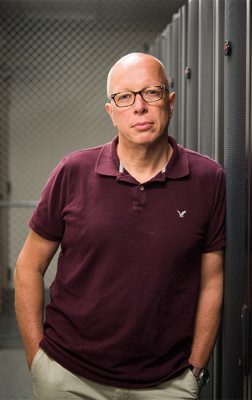Three advisory committees composed of current Boston University faculty will be tasked with various administrative responsibilities for BU’s new Computing and Data Sciences department by Feb. 28. The committees will provide preliminary recommendations to Jean Morrison, university provost and chief academic officer.

Maureen O’Rourke, associate provost for faculty affairs, was named the chair of the committee that deals with faculty appointments. Mark Crovella, a professor of computer science, was appointed the chair for the committee on curricula.
Provost Morrison will be chair for the committee on programs and capacities. Morrison said she invited BU faculty from a wide array of disciplines to join the three committees in late November.
“Given that this new unit will both have its own faculty and teach its own courses and offer degrees,” Morrison said, “we knew that [faculty appointments and curricula] were the two big areas that we wanted to have some faculty input.”
Two priorities Morrison tasked the committees with are figuring out how to get a PhD program in place, as well as hiring faculty for the Fall 2020 semester.
Stacey Dogan, a law professor who is on the curricula committee, said the committee has been meeting roughly once a week for discussions that range anywhere from an hour and a half to three hours in length.
“We’ve taken a look at similar or related programs at different universities around the country,” Dogan said. “We have really just begun the process of making recommendations to the provost about what degree programs should look like in this new program.”
While professors like Dogan may not come from a data science or computing background, Morrison said making the advisory committees interdisciplinary was a crucial and deliberate decision.
“The reason it was so important to have so many faculty from different units is that we want this new academic unit, the faculty of computing and data science, to engage and involve people from all the disciplines at BU,” Morrison said. “In order to create something new that brings the best elements of all the different disciplines, we wanted to have those folks at the table.”
When asked about including student input within the advisory committees, Morrison said they are currently focused on process and structure. Once the committees pass the preliminary stages and begin to delve more into action, Morrison said she is sure students will have the opportunity to provide input.
As the advisory committees continue to work on their recommendations nearing the deadline later this month, Dogan said she hopes their input will result in positive opportunities for students.
“I hope that we will create programs that are really exciting for both current students and prospective students,” Dogan said, “because they’ll create an opportunity for students to work across disciplines… and potentially to pursue degree programs that will prepare them for really exciting careers.”
Erin Dorsey, a senior in the College of Engineering, said she hopes advisory committees planning curricula, such as the one in place for computing and data sciences, seek to balance theory with real world experience.
“I think it’s really important to balance academics with real-world, practical work,” Dorsey said. “Theory is only as good as how you can apply it, and if you’re just spending all day in the classroom working on theory, you’re not actually going to get that real-world experience.”
Alan Cuevas, a freshman in ENG, said once the time for student involvement in creating curricula comes, surveys would be an effective method to gather a wide array of student opinions.
“I don’t think it should be just one or a couple dozen students [giving] input,” Cuevas said. “[They should] just get a bit of a broader population for it instead of just sampling a couple people, because the experience for a dozen people can be different than the entire department.”
Emily Budhram, a sophomore in the College of Arts and Sciences, said a potential solution would be to have students voice their opinions directly to the department in large student-input sessions, similar to the biology department’s current protocol.
“The biology department just started doing this thing recently, where they have big meetings where the students can just come in and out as they please and give opinions on what they want to see in the department,” Budhram said. “I think that’d be really helpful.”






















































































































